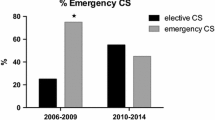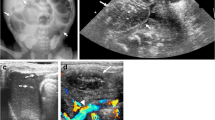Abstract
Objective
To evaluate whether infants with prenatal diagnosis of meconium peritonitis (MP) have a poorer prognosis.
Methods
A retrospective analysis of data from infants treated with surgery from January 2008 to December 2020 was conducted. The patients were divided into prenatal diagnosis group and postnatal diagnosis group based on the timing of diagnosis. The intraoperative and postoperative parameters of the two groups of patients were compared.
Results
A total of 71 cases of MP were included in the study, with 48 cases in the prenatal diagnosis group and 23 cases in the postnatal diagnosis group. The comparison of preoperative indicators between the two groups of patients showed no statistically significant differences in baseline (p > 0.05). Intraoperative indicators, including blood loss, anastomosis, retained intestinal tube length and excised intestinal tube length, showed no statistically significant differences between the two groups (p > 0.05). However, the postnatal diagnosis group had a significantly shorter operation time than the prenatal diagnosis group (p < 0.05). Postoperative indicators, including fasting time, albumin usage, complications, and abandonment or mortality rates, show no difference (p > 0.05). Nevertheless, the postnatal diagnosis group exhibited significantly shorter hospital stay and time to first bowel movement compared to the prenatal diagnosis group (p < 0.05).
Conclusion
Prenatal diagnosis of meconium peritonitis is associated with increased surgical complexity, prolonged hospital stay, and delayed recovery of intestinal function. However, there is no evidence of higher mortality or more complications compared to infants diagnosed postnatally, and there is no significant difference in long-term prognosis.
Similar content being viewed by others
Data availability
No datasets were generated or analyzed during the current study.
References
Nam SH, Kim SC, Kim DY, Kim AR, Kim KS, Pi SY, Won HS, Kim IK (2007) Experience with meconium peritonitis. J Pediatr Surg 42(11):1822–1825
Saleh N, Geipel A, Gembruch U, Heep A, Heydweiller A, Bartmann P, Franz AR, Muller A (2009) Prenatal diagnosis and postnatal management of meconium peritonitis. J Perinat Med 37(5):535–538
Uchida K, Koike Y, Matsushita K, Nagano Y, Hashimoto K, Otake K, Inoue M, Kusunoki M (2015) Meconium peritonitis: prenatal diagnosis of a rare entity and postnatal management. Intractable Rare Dis 4(2):93–97
Shinar S, Agrawal S, Ryu M, Van Mieghem T, Daneman A, Ryan G, Zani A, Chiu P, Chitayat D (2020) Fetal meconium peritonitis—prenatal findings and postnatal outcome: a case series, systematic review, and meta-analysis. Ultraschall Med 43:194
Caro-Dominguez P, Zani A, Chitayat D, Daneman A (2018) Meconium peritonitis: the role of postnatal radiographic and sonographic findings in predicting the need for surgery. Pediatr Radiol 48(12):1755–1762
Chen CW, Peng CC, Hsu CH, Chang JH, Lin CY, Jim WT, Sung YH, Lee SC, Chang HY, Lee HC (2019) Value of prenatal diagnosis of meconium peritonitis: comparison of outcomes of prenatal and postnatal diagnosis. Medicine 98(39):e17079
Wong C, Wong K (2022) Meconium peritonitis: a 22-year review in a tertiary referral center. J Pediatr Surg 57(8):1504–1508
Yeung F, Tam YH, Wong YS, Tsui SY, Wong HY, Pang KK, Houben CH, Mou JW, Chan KW, Lee KH (2016) Early reoperations after primary repair of jejunoileal atresia in newborns. J Neonatal Surg 5(4):42
Piccioni MG, Merlino L, D’Ovidio G, Del PF, Galli V, Petrivelli L, Vena F, D’Ambrosio V, Giancotti A, Brunelli R (2022) Case series of acute meconium peritonitis secondary to perforation of the ileum in the antepartum period. J Clin Med 11(23):7127
Park KH, Bae MH, Lee NR, Han YM, Byun SY, Kim HY (2020) Meconium peritonitis resulting from different etiologies in siblings: a case report. BMC Pediatr 20(1):106
Dias R, Dave N, Garasia M (2016) Meconium peritonitis: a rare neonatal surgical emergency. Indian J Anaesth 60(5):364–366
Zhu Y, Zhang M (2023) A rare case of meconium peritonitis characterized mainly by bilateral testicular hydrocele. Asian J Surg 46(6):2546–2547
Mishra P, Sahoo T, Mohanty PK, Som TK, Tripathy BB, Singh S (2022) Meconium peritonitis presenting with nonimmune hydrops and mirror syndrome. J Indian Assoc Pediatr Surg 27(3):362–364
Wang J, Du L, Cai W, Pan W, Yan W (2014) Prolonged feeding difficulties after surgical correction of intestinal atresia: a 13-year experience. J Pediatr Surg 49(11):1593–1597
Chen C, Peng C, Hsu C, Chang J, Lin C, Jim W, Sung Y, Lee S, Chang H, Lee H (2019) Value of prenatal diagnosis of meconium peritonitis. Medicine 98(39):e17079
Kamata S, Nose K, Ishikawa S, Usui N, Sawai T, Kitayama Y, Okuyama H, Imura K, Okada A (2000) Meconium peritonitis in utero. Pediatr Surg Int 16(5–6):377–379
Shitara Y, Watanabe E, Takahashi N (2021) A term infant with fetal giant meconium hydrocele caused by meconium peritonitis. Pediatr Neonatol 62(4):445–446
Fu F, Song X, Huang F, Yuan H, Xiao L (2022) Fetal meconium peritonitis: a clinical study of nine cases. Comput Intel Neurosc 2022:8658999
Lu Y, Ai B, Zhang W, Liu H (2020) Fetal magnetic resonance imaging contributes to the diagnosis and treatment of meconium peritonitis. BMC Med Imaging 20(1):55
Nakagawa Y, Uchida H, Amano H, Hinoki A, Shirota C, Sumida W, Yokota K, Makita S, Okamoto M, Takimoto A et al (2022) Safety and feasibility of primary radical surgery for meconium peritonitis considering patients’ general condition and perioperative findings. Nagoya J Med Sci 84(1):148–154
Miyake H, Urushihara N, Fukumoto K, Sugiyama A, Fukuzawa H, Watanabe K, Mitsunaga M, Kusafuka J, Hasegawa S (2011) Primary anastomosis for meconium peritonitis: first choice of treatment. J Pediatr Surg 46(12):2327–2331
Peng Y, Zheng H, He Q, Wang Z, Zhang H, Chaudhari PB, Zhong W, Yu J (2018) Is the Bishop-Koop procedure useful in severe jejunoileal atresia? J Pediatr Surg 53(10):1914–1917
Acknowledgements
No.
Author information
Authors and Affiliations
Contributions
Chaoxiang Lu and Mingming Li conceptualized and designed the study, drafted the initial manuscript, and reviewed and revised the manuscript. Qi Gao designed the data collection instruments, collected data, carried out the initial analyses, and reviewed. Qi Wang conceptualized and critically reviewed the manuscript for important intellectual content. All authors approved the final manuscript as submitted and agree to be accountable for all aspects of the work.
Corresponding author
Ethics declarations
Conflict of interest
All authors declare no conflicts of interest.
Additional information
Publisher's Note
Springer Nature remains neutral with regard to jurisdictional claims in published maps and institutional affiliations.
Rights and permissions
Springer Nature or its licensor (e.g. a society or other partner) holds exclusive rights to this article under a publishing agreement with the author(s) or other rightsholder(s); author self-archiving of the accepted manuscript version of this article is solely governed by the terms of such publishing agreement and applicable law.
About this article
Cite this article
Li, M., Lu, C., Wang, Q. et al. Does prenatal diagnosis of meconium peritonitis have the better recovery? A single-center over 10 years of experience. Pediatr Surg Int 40, 94 (2024). https://doi.org/10.1007/s00383-024-05682-4
Accepted:
Published:
DOI: https://doi.org/10.1007/s00383-024-05682-4




